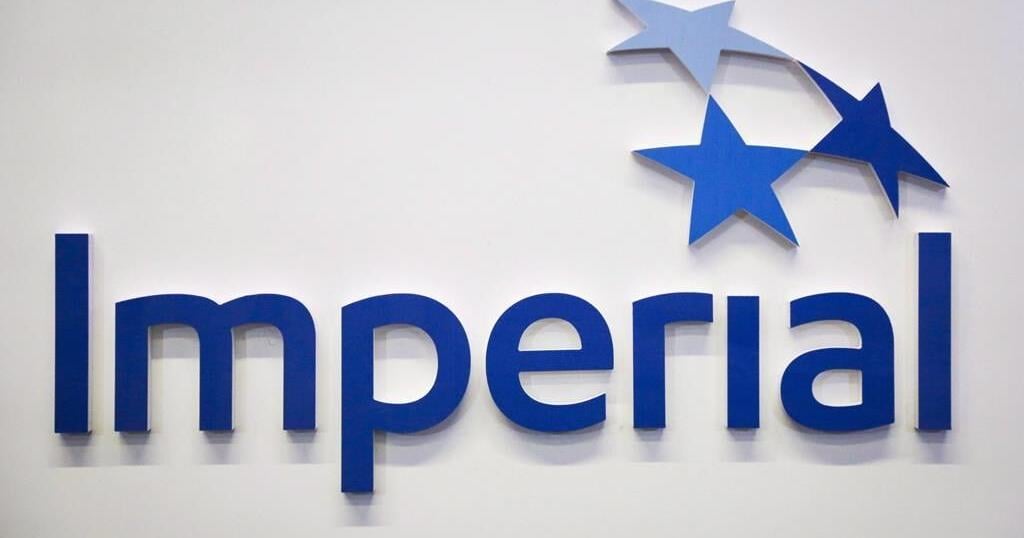CALGARY – Imperial Oil Ltd. provided an update on what will be Canada’s largest renewable diesel facility, saying construction of the complex near Edmonton is going well and should be completed sometime next spring.
The $720-million project under way at Imperial’s Strathcona refinery is expected to have a capacity of more than one billion litres of renewable diesel annually.
The facility will use locally sourced vegetable oils and low-carbon hydrogen to produce a biomass-based fuel, helping set Imperial up for the energy transition by diversifying its petroleum-based portfolio, according to the company.
Imperial chairman and CEO Brad Corson told analysts on a conference call Friday that the company continues to feel good about its decision to move forward with the project, in spite of the fact that a recent glut of renewable fuel supply south of the border is hurting margins for producers of the product in the U.S.
“It’s important to distinguish the market that we see and the economic drivers for us, relative to maybe what you are seeing in other markets like the U.S.,” Corson said.
“For us, we continue to see this as a highly economic project.”
Renewable diesel is chemically equivalent to petroleum diesel. This means it can be transported directly in petroleum pipelines or sold at retail stations without any infrastructure modifications or fuel blending.
That makes it an attractive proposition for fuel refiners in the face of climate-driven regulation such as Canada’s clean fuel standard, which requires liquid fuel suppliers to gradually reduce the carbon intensity of the fuels they produce and sell in Canada.
According to the Canada Energy Regulator, greater production of renewable diesel is one way fuel producers in this country can work toward the federal target of reducing the emissions intensity of their products by 15 per cent below 2016 levels by 2030.
The CER says if countries are to achieve their stated climate commitments, 35 per cent of the world’s diesel fuel supply could be renewable diesel by 2050.
The first stand-alone renewable diesel complex in Canada, constructed by Tidewater Renewables in Prince George, B.C., was completed last year, and there are a handful of other proposed projects across the country.
But in the U.S., renewable diesel production has been surging. Since 2021, renewable diesel and other biofuels production capacity has more than tripled, according to the U.S. Energy Information Administration.
Production of renewable diesel south of the border has now far surpassed fuel blending mandates established by the U.S. Environmental Protection Agency, energy analytics firm RBN Energy LLC says.
In addition, the glut of new renewable diesel facilities are having to compete with each other to secure the feedstocks they need to produce the product. (Renewable diesel can be made from vegetable oil, animal fats, used cooking oil or even algae.)
Corson told analysts Friday that the challenges facing the U.S. renewable diesel market are not issues for Imperial.
“We designed this facility to process agricultural feedstocks, oils that are available in the general area. We’re sourcing from crops and farms that are relatively close, so there’s not significant transportation costs,” he said.
“What is also unique versus what you see in the U.S. is the regulatory environment that we have here,” he added, emphasizing that regulatory incentives at the provincial level combined with the federal clean fuels standard provide more economic support for Canadian projects.
“All of those things together put us in a different, but much better, place than what you might see in the U.S.”
Imperial Oil Ltd. saw a significant spike in net income in its second quarter, which reached $1.13 billion, compared with a net income of $675 million a year prior.
The increase seen in the period ended June 30 amounted to earnings of $2.11 per share on a diluted basis compared with $1.15 per share in the second quarter of 2023.
Imperial attributed the growth in profit to the combined benefit of strengthened North American benchmark crude pricing, as well as the opening of the Trans Mountain pipeline expansion which has helped to reduce the discount Canadian producers have typically taken on their oil due to a lack of export access.
Imperial’s production in the quarter averaged 404,000 gross oil-equivalent barrels per day in the quarter, up from 363,000 a year earlier.
Refinery throughput for the quarter averaged 387,000 barrels per day, compared with 388,000 barrels per day a year prior.
This report by The Canadian Press was first published Aug. 2, 2024.
Companies in this story: (TSX:IMO)
